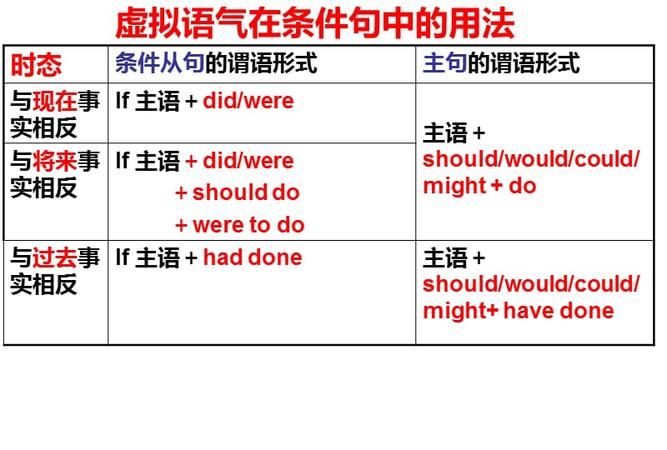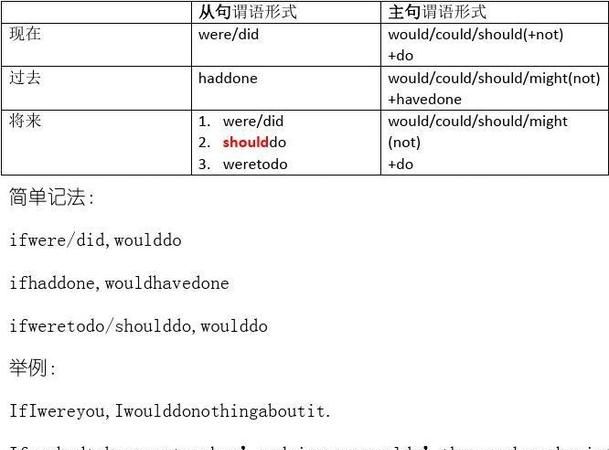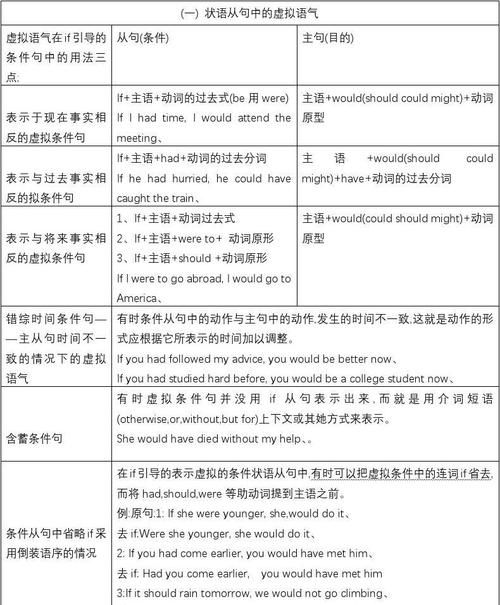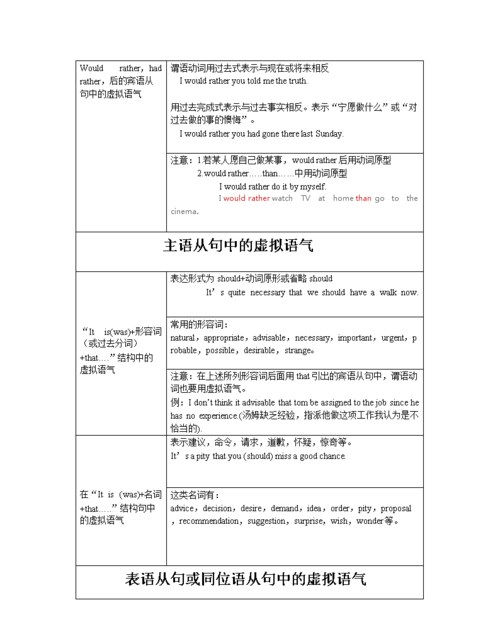本文目录
高考英语虚拟语气语法总结
一.概念: 动词虚拟语气表示说话人的愿望, 假设, 猜测, 建议, 请求, 意图, 设想等未能或不可能成为事实的情况, 或者在说话人看来实现可能性很小的情况, 而不表示客观存在的现实
二.虚拟语气的表现形式: 通过句中谓语动词的特殊形式来表现. 这些特殊形式与谓语动词的某些时态相同, 但它们只表示语气, 而不表示时态, 但含有一定的时间概念
虚拟语气的用法
一.虚拟语气在简单句中的用法: 谓语动词用原形或may +动词原形
1.表示祝愿
a. Long live our country.
b. May you succeed.
c. May you be happy all your life.
2.表示命令
a. Everybody leave the room.
二.虚拟语气在非真实条件句中的用法: (使用虚拟语气的含条件句的复合句称为真实条件句)
1.表示与现在事实相反的情况时, if从句的谓语用动词的过去式 (be动词的过去式多用were, 而不用was), 主句的谓语用should / would / could / might +动词原形 (should多用于第一人称, would多用于二三人称, could / might可用于所有人称)
a. If I had more time, I should study computer better.
b. If he were not so busy, she would attend the meeting this afternoon.
c. If they didn’t take exercises every day, they wouldn’t be so healthy.
d. If you went to bed earlier, you would not be so sleepy in the morning.
e. If she invited me, I should go to the party.
2.表示与过去事实相反的情况时, if从句的谓语用had done形式, 主句的谓语用should / would / could / might + have done的形式
a. If she had invited me yesterday, I should have gone to the party.
b. I would have checked my paper again if I had had more time at yesterday’s exam.
c. If you had taken the teacher’s advice, you would not have failed in the exam.
3.表示与将来事实相反的情况时, if从句的谓语形式是: ①.完全动词过去式 (be的过去式通常用were); ②.should +动词原形; ③.were to do. 其中②, ③种情况都含有出乎意料之外之意; 主句的谓语的形式是: should / would / could / might +动词原形
a. If she should invite me tomorrow, I should go to the party.
b. If it rained / should rain / were to rain tomorrow, our picnic would be put off.
c. If I saw him tomorrow, I would pass your note to him.
d. I might come back if I were to miss the train.
三.虚拟语气在非真实条件句中用法的几个变体:
1.条件从句省略if: 在书面语中, 如果条件从句中的谓语中有were, had, should等词, 可将if省略, 而把were, had, should放在句首
a. Were I you (=If I were you ), I would get up early very early.
b. Had you arrived (=If you had arrived ) at the station ten minutes earlier yesterday, you could have caught the train.
2.省略条件从句或主句, 省略部分的含义仍有所体现. 省略主句时, 表示己不能实现的愿望
a. You could have done it yourself (if you had wanted to).
b. I wouldn’t smoke (if I were you).
c. If my old friends were with me! (要是老朋友和我在一起该多好啊)
d. If you could have seen the wonderful film!
3.主从句时间不一致时, 主从句谓语动词的形式取决于要表示的具体时间
a. You would speak English well if you had practised speaking it every day.
b. If she hadn’t trained so hard, she wouldn’t be able to run so fast.
4.假设的条件不以条件从句, 而以其他方式如介词短语、从句等表达出来, 这种句子称为含蓄条件句
a. What would you do with a million dollars?
b. Without music, the world would be a dull place.
c. We could have done better with more money.
d. He would have given you more help, but he has been so busy.
四.虚拟语气在as if / though从句中的用法:
1.表示与现在事实相反或对相在情况有所怀疑, as if / though从句谓语用过去式
a. He speaks English so well as if she had studied English in England.
b. She looked as if she were ill.
2.表示与过去事实相反的情况, as if / though从句谓语用过去完成式
a. The machines operated as if it had been repaired.
五.虚拟语气在含even if / though从句的复合句中的用法:
在此类复合句中, 若表示与事实相反, 可用虚拟语气形式. 主从句的谓语动词形式与非真实条件句相同
a. Even if I were rich, I would work.
六.虚拟语气在主语从句中的用法:
如果表示说话人的看法, 想法或意见, 在句型 It is / was + adj. + that从句中, 主语从句中可用虚拟语气. 主语从句中谓语动词用should do表示现在或将来情况, 用should have done表示过去情况
a. It is necessary that you should clean the lab before you left.
b. It is important that you should take the doctor’s advice.
c. It was very strange that he should have left without say goodbye.
七.虚拟语气在宾语从句中的用法:
1.在wish的宾语从句中, 通常表示不可能实现或没有实现的愿望, 常用虚拟语气
①.wish的宾语从句用过去式, 表示现在或将来没有实现或不可能实现的愿望
a. I wish I knew the result of the match now.
b. I wish it were spring here all the year round.
c. I wish I could help you.
d. I wish I were young.
②.wish的宾语从句用过去完成式, 表示过去没有实现或不可能实现的愿望
a. We wish we had got the film tickets last night.
b. I wish you I had met him yesterday.
③.wish的宾语从句若用would, 则一般表示请求, 对现状不满或希望未来有所改变
a. I wish the prices would come down.
b. I wish you would help me.
c. I wish he would be more careful.
d. We wish you would spend the holiday with us.
2.在动词suggest (建议), advise (建议), demand (要求), require (要求), order (命令), insist (坚持)后的宾语从句中, 谓语动词常用( should )+动词原形的虚拟语气形式
a. I suggested that we should go there at once.
b. I demand that he should answer me at once.
c. The doctor insisted that the patient should stay in bed for two weeks.
d. The officer ordered that the soldiers should stop playing.
与名词suggestion建议 / advice 建议 / demand要求 / request要求 / order命令有关的从句(包括同位语从句和表语从句等)中的谓语也用 ( should ) +动词原形
a. The black people made a strong demand that the government ( should ) take steps to change the unfair situation.
b. Their demand is that the government should take steps to change the unfair situation.
c. I was Bill’s suggestion that everybody should have a map.
d. His suggestion was that everybody should have a map.
八.虚拟语气用在句型: It is time that(该做某事了)中: that从句中的谓语动词用过去式
a. It is time we got up.
九.虚拟语气用在if only引导的感叹句中: 表示但愿, 要是就好了, 其中谓语形式与wish的宾语从句相同
a. If only he didn’t drive so fast! ( =I wish he didn’t drive so fast.)
b. If only he had taken the doctor’s advice. ( =I wish he had taken the doctor’s advice.)
c. If only the rain would stop! ( =I wish the rain would stop.)
十.虚拟语气用在would rather / prefer后的that从句中: 表示现在或将来情况谓语动词用过去时形式, 表示过去情况动词用过去完成时形式
a. I would rather he came next Saturday.
b. I would prefer you had seen the film yesterday.
c. I would rather that he painted the house blue

什么情况下不用虚拟语气
虚拟语气用来表示说话人的主观愿望或假想,而不表示客观存在的事实,所说的是一个条件,不一定是事实,或与事实相反。即当一个人说话时欲强调其所说的话是基于自己的主观想法,愿望,假想,猜测,怀疑或建议,而不是根据客观实际,就用虚拟语气。
1、表示与现在事实相反的情况: 从句:If 主语+过去时(Be动词用were) 主句:主语+should/would/could/might+do
2、表示与过去事实相反的情况 从句:If 主语+had+done 主句:主语+should/would/could/might+have done
3、表示对将来情况的主观推测 从句:①if+主语+were to do 主句:①主语+should/would/could/might+do ②if+主语+did/were ②主语+should/would/could/might+do ③if+主语+should+do ③主语+should/would/could/might+do

虚拟语气的全部用法归纳
虚拟语气是一个比较困难的语法问题。然而只要我们好好总结一下虚拟语气的构成和用法,那就可以化难为易了。现将虚拟语气有关用法归纳如下:
1.虚拟语气在条件句中的用法
(1)若表示与现在事实相反的假设,则条件从句中用过去式,主句中用过去将来式(would,should,could,might + 动词原形);若表示某事将来实现的可能性不大,则条件从句中用should + 动词原形也可用“were to+动词原形”或用过去式动词。如:
I would certainly go if I had time.(现在)
If it should rain,we wouldn”t go out.(将来)
If I knew German,I would read the paper to you.(现在)
If he were here,we could ask him.(现在)
(2)若表示与过去事实相反的假设,从句中用过去完成式,主句中用过去将来完成式(should,would,could,might + have + 过去分词)。如:
If I had set off a little earlier, I would have caught the train.
She would / might have come if she hadn”t been so busy.
If I hadn”t taken your advice,I would have made a bad mistake.
If only you hadn”t told him the news.
(3)含有虚拟语气的条件状语从句中,如有had,should,were 这三个词的话,在正式或书面语言中可将if省略,再将句子的主语和谓语动词实行全部倒装或部分倒装。如:
Had they time(=If they had time),they would certainly come and help us.
Should it be fine(=If it should be fine),we would go for an outing.
Were I go(=If I were you), I would go.
(4)若主句从句所指的时间不一致,即条件从句表示与过去事实相反,主句表示与现在事实相反;或者条件从句表示与现在事实相反,主句表真实情况,则从句中应采用与具体时间相对应的虚拟形式。如:
If it had rained last night(过去),It would be very cold today(现在).
If I had taken your advice(过去),I should have no trouble with the work now(现在).
2.虚拟语气在宾语从句中的用法
在动词suggest,order,demand,propose,request,command,insist等后的宾语从句中,用虚拟语气(即Should+动词原形或只用动词原形)来表示愿望、建议、命令、请求等。在动词wish /would rather后的宾语从句中,用过去式表示与现在事实不符,用过去完成式表示与过去事实不符。如:
I suggest that we(should)set off at once.
The doctor insisted that the patient (should)be X-rayed.
I wish I were as strong as you.
I would rather that you hadn”t told him.
3.虚拟语气在主语从句中的用法
在It is necessary/important/strange/natural;It is requested/suggested/desired/proposed;it is a pity等结构后的主语从句中要用虚拟语气,即Should+动词原形或只用动词原形。如:
It is necessary that he(should)be sent there at once.
It is requested that Professor Li(should)give us a speech.
It is desired that we(should)get everything ready by tonight.
4.虚拟语气在表语从句、同位语从句中的用法。
在 suggestion, proposal,idea,plan,order,advice等名词后的表语从句、同位语从句中要用虚拟语气,即should+动词原形或只用动词原形。如:
Our suggestion is that you( should)be the first to go.
My advice is that we(should)send for Doctor Li.
Do you know the order that you(should)keep watch?
5.虚拟语气在其他状语从句中的用法
在as if引导的状语从句中,用过去式表示与现在事实不符,用过去完成式表示与过去事实不符;在so that,in order that引导的状语从句中,常用should/would/could/might+动词原形来表示虚拟语气。如:
They talked as if they had been friends for years.
She stayed at home for a few days so that she could take care of her mother.
He took a taxi to the station so that she should not miss the train.
6.虚拟语气在定语从句中的用法:
在it is time后面的定语从句中常用过去式表示虚拟。

whether虚拟语气用法是什么意思
虚拟语气用来表示说话人的主观愿望或假想,而不表示客观存在的事实,所说的是一个条件,不一定是事实,或与事实相反。虚拟语气通过谓语动词的特殊形式来表示。英语中的语气分为陈述语气、祈使语气、虚拟语气三类。
1. Be 式虚拟语气:建议, 命令或请求
这里所说的be式统指不带to的动词不定式,用于所有人称和时间。
正式文体中,在表示建议, 命令或请求的动词后,that从句的动词常常用这一形式,尤其是在美国英语中。
例如:(a—c).
英国英语很少这样用,往往要在前面加情态动词should (a)
a) He asked that they (should) be allowed to leave.
他请求准许他们离开。
b) I suggested that we meet outside by the fountain.
我建议我们在外面喷水池旁见面。
c) He urges that the restrictions be lifted.
他敦促取限制消
可以这样用的动词通常有:
advise, ask, beg, command, decree(命令), demand, direct (命令), insist, order, plead (恳求), propose, recommend (建议. 忠告), request(请求), require (要求, 命令), urge(极力主张), prefer等。
注意,这种用法也涉及与这些动词及其派生词有关联的那些结构中的that从句(d—f)
d) It is requested that he be told the truth as soon as possible. 要求尽早把真实情况告诉他。
e) My proposal is that the meeting be postponed till a later time. 我的提议是把会议推迟到以后再开。
f) Her advice that John (should) wait until next week is quite reasonable. 她劝约翰且等到下星期,这是合情合理的。
在 It is important that等表示必要性迫切性的句子中,that从句的动词也可用这种形式(g—i)。
E.g.
g) It is imperative that he (should) make a quick decision. 他必须尽快做出决定。
h) It is important that everybody get prepared beforehand. 人人都要事先准备好,这一点是很重要的。
i) It is necessary that he be sent there right now. 需要马上将他派往那儿。
可以这样用的形容词通常有:advisable(可取的明智的), desirable(合意的), essential (基本的必须的), imperative (急需的,必要的), important, necessary, obligatory (义不容辞的, 必须的), urgent(紧迫的), vital (至关重要的, 所必需的)等。
* 当其中的某些动词`用于别的意思时,that从句中的动词就不能用虚拟语气。例如:
His question suggested that he doubted my sincerity. 他的提问表明他怀疑我的诚意。
She insisted that she was innocent. 她坚持认为自己是清白的。
2. 用于lest状语从句
正式文体中,连词lest后的动词可用不带to的不定式,表示目的或理由 。
而在非正式文体中,则常在动词 前加情态动词should或might。
a) He ran away lest he (should/might) be seen。他怕被人家看见,跑开了。
b) I was afraid lest she (should) be offended。我惟恐把她给得罪了。
c) We worried lest the secret become known。我们担心秘密被泄漏。
3.Were式虚拟语气:虚拟条件句
这里所说的were式统指任何动词的过去时形式。
谈到事实上不存在或不大可能发生的事情时,用虚拟条件句。有三种情况:
1)谈论现在或将来的情况,if从句的动词用过去时,主句动词前用would (a-d)。
例如:
a) I'd hurry up if I were you. 要是换了我,我就会加紧。
b) If it were / was not raining now, I would go for a walk. 要是天没有下雨,我就去散步。
c) If I could afford it, I would buy a boat. 如果我的钱够,我就买条船。
d) If war broke out, what would you do? 如果战争爆发,你会怎么做?
2)谈论将来情况时,较正式的用法是if从句用should,主句可用would或will (e)。另一种方法是从句用were to,主句用would (f)。
E.g.
e) We wouldn't / won't lose courage if we should fail again.倘若我们再次失败我们也不会气馁。
f) If I were / was to do it, I would do it in a different way。如果我来做,我会用另一种方式。
3) 谈到过去没有发生过的事情时,if从句用过去完成时,主句用“would + have + 过去分词(g,h)。
E.g.
g) If you had told me about your problem, I would have helped you. 要是你早告诉我你的困难我会帮你的。
h) If it hadn't been for your help, I really don't know what I'd have done. 要是没有你的帮助,我真不知道会搞成什么样子。
注意,正式文体中,谈到现在或将来情况时,动词be在从句中都要用were。但在口语中,除了“if I were you”这种表达方式以外,主语为单数时也有用was的(b,f)。
4.. could,might或should在主句中的使用
虚拟条件句的主句中,一般加情态动词would,但有时也可用could,might或Should。
could表示能力或许可,意思相当于would be able to (a)。
E.g. a) If the roads weren't so icy, we could go much faster.
要是路上没有那么多冰,我们可以走得快得多。
could加不定式的完成式表示本来能够做到的事没有做到(b)。
might/Could表示可能性或许诺,意思相当于would possibly (c)。
E.g. b) If my parents hadn't been so poor, I could have gone to college.
如果我的父母不是那么穷,我本来是能够上大学的。
c) If you asked me nicely, I might/could take you out for lunch.
要是你好好求我,我可以带你出去吃午饭。
might/could加不定式的完成式表示本来也许会发生的事没有发生(d)
E.g. d) If he had made adequate preparations, he might/could have succeeded要是准备充分,他也许已成功。
should的意思与Would相同,用于I或we之后。
在美语中通常用would
E.g. :
e) I should be more careful if I were you。
f) I shouldn’t have done it if it hadn‘t been necessary.
5. 省略if
在正式文体或文学作品中,有时将条件从句中的if省略;同时把第一个动词置于主语之前(a-e)。只有在从句的第一个动词为should, were或had时才可以这样用。
要记住在这种时候只可用were, 不可用was (b,c)
E.g.
a) Should any visitors come, I would / will say you are not in. 如果有人来访,我就说你不在
b) Were it all true, it would still not excuse their actions.就算这全是真的,也不能原谅他们的行为。
c) Were anything to happen, I would return immediately. 是发生什么事,我立即回来。
d) Had we enough time, things would be easy. 我们有充足的时间,事情就好办了。
e) Had we known about it, I would have told you.要是我知道了这件事,我早就告诉你了。
6. 从句与主句时间或语气的不一致
在虚拟条件句里,主句和从句的时间通常是一致的,但有时出于意思的需
要也可能不一致。
多数情况是,条件从句讲的是过去的事情,主句讲的是现在的情况(a,b)。
a) If I had had breakfast, I would not be hungry now. 要是我吃了早饭,现在就不会饿了。
b) If he hadn't spent so much money, he would be rich today. 如果他过去不大手大脚地花钱,今天就会很富裕了。
偶尔,也有可能条件从句讲的是通常情况,主句讲的是过去的事情(c)。
c) If he were a good student, he would have studied for the test. 如果他是个好学生,他早就会为考试复习好功课了。
有时说话人可能会在中途改变语气。如条件从句用虚拟语气(觉得可能性不大),而主句用了陈述语气(认为可能性较大)(d)。
d) He’s not bad-looking if his face were not so pale. 他并不难看,要是他的脸色不那么苍白的话。
主句还可以用祈使语气,用以提出请求(e)。
e) Should you change your mind, let us know. 要是你改变主意,就请告诉我们。
7. 没有if从句的虚拟条件句
虚拟条件句有时候不必用if从句,而是借用其他手段来表达假设条件。
最常见的是用介词短语,有时也用别的短语(a-d)。
E.g. a) I could do nothing without you.
要没有你,我什么也干不成。
b) But for the storm, we should have arrived earlier. 要不是下暴雨,我们本该早一点到达。
c) We could have done better under more favorable conditions.
如果条件再有利一点,我们会做得更好。
d) She ran; otherwise, she would have missed her bus. 她奔跑着,要不然就赶不上公共汽车了。
e) It would be a mistake not to help him.要不帮助他,那将是个错误。
8.用于Wish和Would rather/Sooner后
动词wish后加that从句可以表达一种愿望,希望事情不是实际存在的那样。从句中that经常可省略。
如果指的是现在或将来的事情,从句中的动词用相应的过去形式(a-d)。
a) I wish I lived nearer New York.
b) I wish it wasn't / weren't so cold.
c) I envy you. I wish I was / were going away too.
d) I wish I could persuade her.
如果指的是过去的事情,从句中的动词用过去完成时(e,f)。
e) She wishes she hadn‘t said that.
她希望她没有说过那样的话。
f) I wish Mary could have come.
要是玛丽那时能来就好了。
从句中也可用would来提出要求,建议或希望,有时带有不满或不耐烦的意思(g,h)。
g) I wish you would shut up.
我希望你闭上嘴。
h) I wish he wouldn't play his record so loudly.
我希望他不要把唱片放得那么响。
当wish为过去时的时候,从句动词的用法与wish为现在时的时候一样(i,j)
i) The inspector wished he carried a gun.
警官希望自己带了枪。
j) He wished he had phoned for a cab.
他希望他打过电话要出租车。
注意,纯粹希望将来如何的时候,不能用wish而要用hope。
如: I hope you like this house。我希望你喜欢这间房子。
I hope I'll see you before you go.我希望在你走前能见到你。
9. . 用于if only后词组if only可用来表达强烈的愿望:
如果谈现时的情况用过去时(a—c);
a) If only I were rich. 但愿我很有钱。
b) If only I could swim! 我会游泳该多好!
c) If only he didn't snore! 要是他不打鼾就好了!
如果提起过去的事情用过去完成时(d)。
if only还可与would连用表达愿望,这时常带有遗憾或不满的含义(e,f)。
d) If only he'd remembered to buy some fruit. 要是他当时记得买些水果来该多好。
e) If only he wouldn't eat so noisily. 真希望他吃东西时不要发出那么响的声音。
f) If only it would stop raining! 真希望雨停!
这一结构也可用于虚拟条件句(g)。
g) If only I had more money, I could buy the new clothes. 要是我有更多的钱就好了,那我就可以买那些新衣服了。
要注意它与only(只有,只要)的区别,only if用陈述语气,常置于句首:Only if the green light comes on can you Cross the road.只有绿灯亮了才可以过马路。
10. 用于其他结构
词组it is (about/high) time (that)后可接一个用简单过去时的从句,以提出建议或忠告,意思是“该做某事了”或“早该做某事了”。
这时,它指的是现在或将来,而不是过去。
用作插入成分的词组as it were(=So to speak,可以说,在某种程度上)中,永远
要用were,不可用was。
注意它跟as it is (或was)(=in reality,实际上)的区别:
They agreed to buy the house as it is.看样子他们同意买那所房子。

以上就是关于一般虚拟语气的用法 ,高考英语虚拟语气语法总结的全部内容,以及一般虚拟语气的用法 的相关内容,希望能够帮到您。
